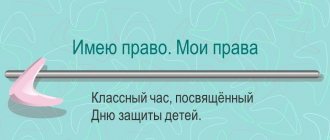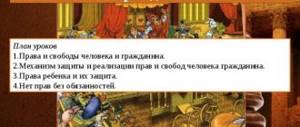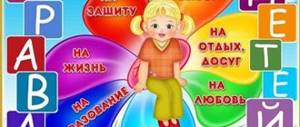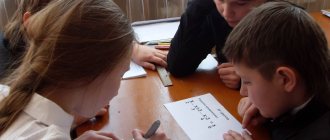Legal education activities in middle and high schools
Middle and high school students are yesterday's children, step by step entering adulthood. The teenage period is characterized by a very unstable mental state, mood swings, and self-searching. Such an unstable and insecure state makes teenagers vulnerable to socially dangerous individuals, to the temptation to cross the law, and to the whole huge world that they still do not know at all.
That is why legal education is not only important, but also vital. Teenagers are already able to separate good and bad, and if they do bad things, they do it consciously.
The final goal of the legal education of adolescents is a formed law-abiding personality.
Activities for the legal education of young people must have a specific goal and require active participation from adolescents. For educational work to be effective, all aspects of the student’s social environment must be involved in the preparation and conduct of events: family (parents), school, representatives of the public and law enforcement.
Legal culture and education
The forms of activities aimed at legal education of senior schoolchildren can be any:
- Conversation;
- Thematic class hour;
- Information posters (it is better if the students make them themselves);
- Games, competitions, quizzes;
- Excursions;
- Exhibitions, visual propaganda;
- Meetings – lectures with representatives of social structures;
- Parental education
Sample topics for civic education events for students in grades 5-11
| Event form | Topic (task) |
| Cool hours in middle classes | 1. “About the dangers of smoking”, |
| 2. “You are wrong if you don’t know the rights” | |
| 3. “Forewarned is forearmed” | |
| 4. “The laws of life of the school community” | |
| 5. “What is integrity” | |
| 6. “Rules of trust” | |
| 7. “Conflicts in a team and ways to resolve them” | |
| 8. “I am a citizen of Russia” | |
| Classroom hours in high school | 1. “Be able to say “no” |
| 2. “Addiction or addiction? | |
| 3. “Ignorance of the laws is no excuse” | |
| 4. “What is decency in life” | |
| 5. “What does it mean to be principled?” | |
| 6. “What is a goal | |
| 7. “Freedom of sexual relations” | |
| 8. “Love and friendship | |
| 9. "Drug Law" | |
| 10. “My rights are my responsibilities” | |
| 11. “How to avoid becoming a victim of crime” | |
| Competitions, quizzes, games | 1. Quiz “I know my rights” (for Children's Rights Day) |
| 2. Role-playing game “We and the Elections” | |
| 3. Legal game “Me and my rights” | |
| 4. Business game on law “Your own lawyer” | |
| 5. G8 Quiz for Aspiring Politicians | |
| Visual propaganda | 1. Stand “Schoolchildren’s Legal Corner” |
| 2. Exhibition of thematic literature “Prevention of bad habits in adolescents.” | |
| 3. Exhibition of drawings “Our rights in drawings”; | |
| 4. Poster competition “I choose life!” | |
| Parental education | 1. “Problems of preventive work with pedagogically neglected children” (together with OPPPN ATC) |
| 2. “Parents’ preparedness for their children’s crises” (middle grades) | |
| 3. “Employment of children at risk in clubs, sections and electives” | |
| 4. “A teenager and his professional interests” |
Extracurricular activity in primary school on the topic: Children's rights
Topic: A fabulous journey through child rights.
Goal: to develop legal and economic concepts in students for fairly successful adaptation in everyday life. Objectives: 1. Formation of personality qualities such as organization, independence, responsibility. 2. Formation of a respectful attitude towards work and material values. 3. Fostering respect for the law and norms of collective life. Equipment: 1. Posters of houses of 3 little pigs, trees, river, pictures: Wolf, Bear, Mice. 2. TV, DVD player, “Leopold the Cat” disc. 3. Disc “Relaxation”. Preparatory work: dramatizations of excerpts from the fairy tales “The Three Little Pigs”, “Masha and the Bear”, the song of Leopold the Cat. Progress of the lesson: 1. Organizational moment. Host: For a good mood, let's smile at each other. 2.Introduction to the topic and tasks. Host: Hello, guys! Hello, dear guests! Today we have gathered for a lesson called “A fabulous journey through child rights.” You are still little kids, but you already have not only your rights, but also responsibilities. Today we will learn what these rights and responsibilities are and repeat those already known to us, setting off on a fabulous journey. 3. Studying new material. Host: A long time ago, people came up with rules: what you can do and what you can’t do, so that there is always order in everything. Do you know how to behave? And now we will go to visit fairy tales and, like real experts in the rules, we will see who behaves well and who violates the order. Let's board our magic carpet airplane, close your eyes! (Music sounds). Host: Open your eyes! Watch and listen carefully, and then answer, who acted badly in this fairy tale? A dramatization of the fairy tale “The Three Little Pigs.” Author: The pig brothers lived in the Far Fairytale Forest. The piglets were not afraid of neither the heat nor the thunderstorm. Together the brothers sang a song: Everyone: We are not afraid of the gray wolf. Author: Everyone also decided unanimously Everyone: We need houses for winter. Junior: I didn’t build a mansion. I made a house out of straw. In a clearing, beyond the meadow. I quickly built a house. Author: The middle brother decided that he would build a house from the branches. Middle: There are a lot of branches and I’m already guys in the hut. Author: The elder brother did not sunbathe, the elder collected stones, so that later he could build a house from stones. Senior: I worked, I didn’t sit, I didn’t look at my brothers, I built a house better than anyone else To live peacefully in it. Author: They began to live in houses and did not notice the trouble. And the gray wolf walked through the forest and found a straw house. blew on him three times : There was nothing left. Author: The younger brother does not sit. The younger one runs towards the middle one. The wolf broke the house and then the Brothers ran to the eldest. The wolf has an interest Wolf: Brothers, I climbed into the chimney! Author: But he fell into boiling water and took off running. And the three funny little pigs sang a song loudly, loudly. All: We are not afraid of the gray wolf. Author: And the wolf, with all his strength, carried away his legs. Host: You watched the fairy tale “The Three Little Pigs” carefully, and now answer, who behaved badly? Students: The wolf behaved badly. Host: Look at the pictures carefully and choose the one who behaved badly! Why did you decide so? Students: He wanted to eat three piglets. Host: Did the piglets want to live? This means that the wolf violated their right to... Students: life. Host: Whose rights to life did the wolf violate? Students: The rights of piglets. And you guys also have the right to life, and no one has the right to take your life. But we must not forget about bad people. Who protects our right to life? Students: Police. Host: What is the phone number for the police? Students: 02, 020. Presenter: Well done! Presenter: We sit on the magic carpet, close our eyes and go to the next fairy tale. (Music sounds). Host: Open your eyes. And now the guys will show us a scene from the fairy tale “Masha and the Bear.” And you be very careful, and then answer “whose rights were violated?” A dramatization of the fairy tale "Masha and the Bear". Author: The bear returned in the evening, saw Mashenka, and was delighted. Bear: Yeah. Author: The bear speaks. Bear: Now I won’t let you go! Masha: Let me go, bear, to my grandfather, to my grandmother. Bear: No! You will live with me, you will light the stove, you will cook porridge, you will feed me porridge. Author: Masha pushed, grieved, but nothing can be done. She began to live with the bear in the hut. Host: You looked, and now tell me, whose rights were violated? Students: In this fairy tale, Masha’s rights were violated. Host: Who violated Masha’s rights? Students: Bear. Host: Did the bear have the right to hold Masha? Students: No. Host: What right did he violate? Students: The right to freedom. Host: Do you have the right to freedom? Students: Yes. Host: Now close your eyes, sit on our magic carpet, we are going to visit Leopold the Cat. Now you will watch an excerpt from the cartoon, and then answer, which of the characters behaved well? Watching the cartoon "Leopold the Cat". Host: You watched very carefully, now tell me which of the heroes behaved well? Students: Cat. Host: Who violated the rights of Leopold the Cat? Students: Mice. Host: What did they do wrong? Students: They spoiled things. Host: What right did they violate? Students: The right to inviolability of property. Host: You cannot touch other people’s property without the owner’s consent. Well done! We sit on the magic carpet and close our eyes. Let's head back to school. 4. Fastening. Presenter: Guys, look, the mice not only ruined things for Leopold the Cat, they also played pranks on us, they swapped the rights of our heroes. Let's put them correctly, in their places. Host: Well done, guys, I think you will never do bad things, but be kind, friendly, polite like Leopold the Cat. Performing the song Leopold the Cat.
1 verse.
Let's forget everything that happened. I've been wanting to say this for a long time. It’s a pity to waste energy on a fight. We need it for good deeds. Chorus: The sun shines brighter The nightingale chirps It’s more fun for the good to live in the White World. Verse 2 I’m not a coward, I admit honestly, I just think this: On this beautiful earth there is no place for the unkind and for the bullies. Chorus: Presenter: Guys, you are now students, and what right does the state give you as students? Students: Right to free education. Host: But you guys have not only rights but also responsibilities. What is the main responsibility of a student? Students: Good study. Host: What other responsibilities do you know? Students: 1. Wake up early in the morning and wash yourself thoroughly. To avoid yawning at school, don’t peck your nose at your desk. 2. Dress neatly to make it pleasant to look at. 3. Iron the uniform yourself, check it. You’re big already. 4. Train yourself to be tidy. Don’t play hide and seek with things. 5. Treasure every book. Keep your briefcase clean. 6. Don’t giggle in class. Don’t move your chair here or there. 7. Respect your teacher and don’t disturb your neighbor. 8. Don’t tease, don’t be arrogant. Try to help everyone at school. Don’t frown in vain, be bolder and you will find friends. Host: And now it’s time for you kids to play. (If the answer is correct, everyone says “It’s me, it’s me, these are all my friends!”; if the answer is incorrect, they clap their hands). Who walks to school in a cheerful band every day? Which one of you comes to class an hour late? How many of you keep your books, pens and notebooks in order? Which of you kids walks around dirty from ear to ear? Who completes their homework on time? In class, which one of you is making noise and rustling leaves? Who knows the duties? Every day they are fulfilled? 5. Summary of the lesson. Host: You know your responsibilities. Now tell me, what fairy tales have we visited? What did they teach us? What rights have you learned and reviewed? Well done boys!
We recommend watching:
Extra-curricular educational activity for primary classes Synopsis of an extra-curricular activity for younger schoolchildren. Inhabitants of the fresh water reservoir KNV in elementary school for the 100th anniversary of V. Dragunsky Extracurricular open lesson. Schoolchild's daily routine
Similar articles:
Class hour. Child's rights, 3rd grade
Mathematical brain-ring, 3rd grade. Scenario
Intellectual game, 4th grade. Abstract
Extracurricular activity in grades 3-4 on the topic “By countries and continents”
Extracurricular activity for grades 3-4. Great inventions
Legal education activities in primary schools
The main period of personality formation occurs precisely during the period of primary school education. Legal education plays an important role in this process, closely intertwined with patriotic and moral education.
When planning his work to introduce children to legal concepts, the teacher should remember their age characteristics. It is difficult for children of primary school age to perceive legal terms; many concepts need to be given to them in an understandable, still “childish” language. For students in grades 1-4, the teacher must very carefully filter the information, adapting it according to the age of the children. In elementary school, legal education does not yet take place independently, but is a continuation of moral and patriotic education.
In elementary school, legal education activities most often take place in the form of a game. This can be a didactic game, a quest game in the form of a journey (acquaintance with the state symbols of Russia), role-playing and word games. Such games develop children's interest in the history of their country, awaken civic feelings, and at the same time lay knowledge in the legal field.
Legal education at school
Another form of events is themed classes. Class hour provides an opportunity to have a conversation, a game, or a quiz. A didactic game can become a continuation of a conversation during a class hour (after a conversation about human rights, conduct a didactic game “prohibiting and permissive signs of behavior”).
The knowledge that children gain during such activities increases their self-confidence. Younger schoolchildren learn to value the work, experience, and achievements of their ancestors, realizing themselves as part of the country, society, and their responsibility to the country and others.
Sample topics for activities on civic education for primary school students
| Event form | Themes |
| Themed classroom hours | 1. “It’s not clean where they clean” (saving natural resources: water, electricity, fuel, food) |
| 2. “Own and foe” (rules of behavior on the street) | |
| 3. “Call the emergency services” (emergency telephone numbers) | |
| 4. “Rights and responsibilities of a schoolchild” | |
| 5. “Rights, duties and responsibilities of a child under 10 years old”, “Home Alone”, “We are all different, but we are one family!”, “Lottery of politeness, good deeds and funny undertakings” (about the education of the individual in a team) | |
| Didactic and role-playing games | 1. “An unusual school trip” (game workshop on rules of behavior at school), the concept of legal acts (conversations) |
| 2. Business game “Me and my rights” (introduction to the concepts of “citizen”; “civil rights”; “children’s rights”; “responsibilities of schoolchildren”; learn to apply rights and responsibilities in everyday life) | |
| 3. Game-quiz “I have the right” (Continue to introduce children to their rights. Learn to express their rights in a system of symbols. Form in the form of a game a correct and fair view of life situations, initial ideas about the rights and responsibilities of a person, a citizen. | |
| Exhibitions | 1. Exhibition of drawings for Children’s Day “Our rights in drawings” |
| 2. Poster competition “No to bad habits” | |
| Parental education | 1. “How to protect a child from violence” |
| 2. Child’s free time | |
| 3. “School crime prevention system” |





